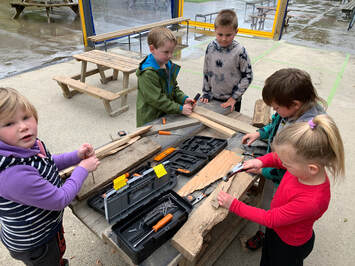Learning Through Play

Why do we believe in Learning Through Play (LTP)?
"I have been fortunate to spend time this year at Myross Bush school in Matai. As part of my study to become a qualified Resource Teacher of Learning and Behaviour, I have researched how play-based pedagogy supports the implementation of The New Zealand Curriculum. There is a wide range of research and evidence that shows the benefits of learning through play for children’s wellbeing, learning, and development, and I have appreciated the opportunity to spend time in Matai and see this theory being put into practice in the classroom. Research shows that children do learn and develop through actions and activities other than play, but play is the most effective way to establish the foundations needed for later learning, including language skills, problem-solving, creativity, self-regulation, cognitive skills, social skills, and physical skills. Among the benefits I have observed in Matai is the way the programme supports all children, regardless of their academic or social competence, to have a positive transition to school, and accommodates the diversity of interests, strengths, and learning needs that the five years old’s starting school come with. The way the classroom programme is designed, with a blend of workshops, large group times, small group activities, and opportunities for self-directed learning through play, means the teachers not only understand the children’s current literacy and numeracy knowledge, but also have a deep understanding of who the child is as a learner, and the teaching strategies and learning experiences that will increase their engagement and participation in learning and build on their current knowledge and competencies." (Michelle Clarke; 2020, Resource Teacher of Learning and Behaviour, Southland)
For more information consider the following links:
- By allowing children space and time to play they will show what they know, what they are capable of, and what they want to learn about. Through play, they explore and express their ideas, interests, and passions. We are then able to design richer, more authentic, interest-centred inquiries and projects where children are engaged in complex thinking, expression, and exploration across the curriculum.
- Our National Curriculum identifies several values and Key Competencies that we strive to teach our children. Almost all of them can be developed through play-based activities: innovation, inquiry, curiosity, sustainability, respect, thinking, using language symbols and text, managing self, relating to others, participating and contributing. As well as these play offers many rich opportunities across all the curriculum areas such as Science, Social Sciences and Mathematics.
- Play contributes positively to a child’s sense of well-being. It enhances a child’s natural capacity for intense and self-motivated learning. It helps build creative and critical thinkers, and lets children test social boundaries. Play produces curiosity, openness, optimism, resilience and concentration. It enhances a child’s memory skills, develops their language skills, helps regulate their behaviour, advances their social skills and encourages academic learning to take place.
- Learning through play empowers learners to have a mindset that says ‘I can grow my brain; I give it a red hot go; I persist’ (Growth Mindset - Myross Bush School 'Ako the Active Learner')
- Play allows children time to trial several ways to solve problems that are meaningful for them and naturally occur in their play. With support they develop a bank of problem solving strategies to draw from.
- Supports children’s transition to school by making more connections to their prior-to-school experiences from early childhood education and home.
- Play has been consistently described across time as central to cognitive, language, cultural, and social development. Lev Vygotsky, 1978, said that ‘In play a child always behaves beyond his average age, above his daily behaviour; in play it is as though he were a head taller than himself. As in the focus of a magnifying glass, play contains all developmental tendencies in a condensed form and is itself a major source of development.’
"I have been fortunate to spend time this year at Myross Bush school in Matai. As part of my study to become a qualified Resource Teacher of Learning and Behaviour, I have researched how play-based pedagogy supports the implementation of The New Zealand Curriculum. There is a wide range of research and evidence that shows the benefits of learning through play for children’s wellbeing, learning, and development, and I have appreciated the opportunity to spend time in Matai and see this theory being put into practice in the classroom. Research shows that children do learn and develop through actions and activities other than play, but play is the most effective way to establish the foundations needed for later learning, including language skills, problem-solving, creativity, self-regulation, cognitive skills, social skills, and physical skills. Among the benefits I have observed in Matai is the way the programme supports all children, regardless of their academic or social competence, to have a positive transition to school, and accommodates the diversity of interests, strengths, and learning needs that the five years old’s starting school come with. The way the classroom programme is designed, with a blend of workshops, large group times, small group activities, and opportunities for self-directed learning through play, means the teachers not only understand the children’s current literacy and numeracy knowledge, but also have a deep understanding of who the child is as a learner, and the teaching strategies and learning experiences that will increase their engagement and participation in learning and build on their current knowledge and competencies." (Michelle Clarke; 2020, Resource Teacher of Learning and Behaviour, Southland)
For more information consider the following links:
- Powerful Play: Continuity and inquiry for children starting school
- What 3-7 year olds need to learn - Nathan Mikaere Wallis
- Study: Too Many Structured Activities May Hinder Children's Executive Functioning
- The decline of Play - Peter Gray
- The importance of Play - Dr David Whitebread, University of Cambridge

